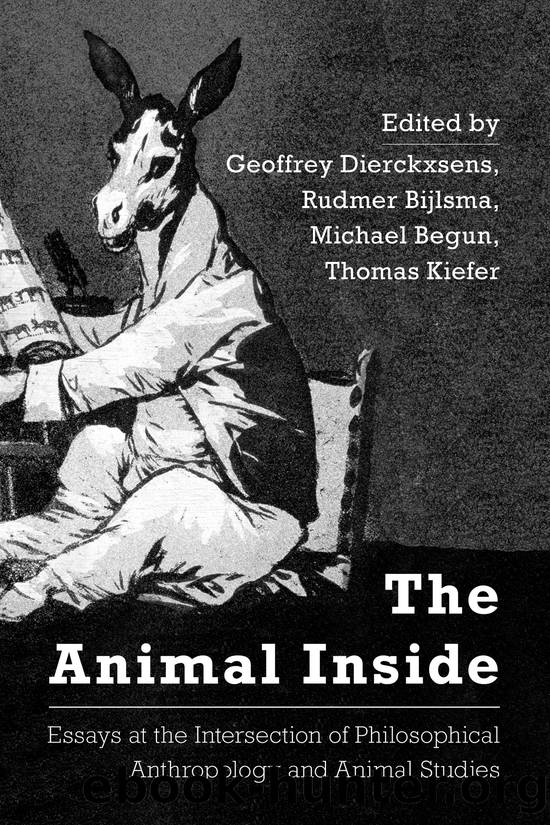The Animal Inside by Dierckxsens Geoffrey;Bijlsma Rudmer;Begun Michael;Kiefer Thomas;

Author:Dierckxsens, Geoffrey;Bijlsma, Rudmer;Begun, Michael;Kiefer, Thomas;
Language: eng
Format: epub
Publisher: Rowman & Littlefield Unlimited Model
Chapter 8
Werewolves
A Reconsideration of Hobbesâs State of Nature from the Perspective of Biopolitics
Herbert De Vriese
Since the publication of Foucaultâs 1975â1976 lectures at the Collège de France titled Il faut défendre la société (1997, 2003) and Agambenâs Homo Sacer (1995, 1998), there has been increasing attention for the biopolitical nature of modern politics, spreading thoughtful analyses and well-researched case studies over the fields of political philosophy and social and political theory. As a consequence, our understanding of the origin and specific nature of modern politics has changed. Widely accepted views of the transition from the classical doctrine of politics to modern political science have been challenged and put into a sharper light. So let us first consider the different aspects of the standard interpretation and then see how they have been revised in the light of a continually increasing insight into the biopolitical tendencies of modernity.
In its broad lines, the standard interpretation ran as follows. The classical doctrine of politics viewed man as essentially a social and political being. The logical corollary of such a view was that classical approaches to politics always remained within the boundaries of a civilized and distinctly human context, making no strict separation between politics and ethics. Their primary ambition was practical instruction in leading a good and exemplary life in a given political context. Modern political theories, by contrast, generally preferred to take the state of nature as the logical starting point of their investigations. Accordingly, these theories tended to reduce man to essentially a biological being, which by means of political mediation (such as the social contract and the declaration of human rights) still had to be transformed into a fully human being. The principal goal for modern political thought was to find the organizing principles of a specifically human order that would protect man from the hardship of life in the state of nature.
The modern thinkers no longer ask, as the Ancients did, about the moral conditions of the good and exemplary life, but about the actual conditions of survival. The assertion of physical life, elementary survival, is directly at issue.1
Indeed, with the successful emancipation of man from his natural condition now arising as the major political problem, modern political theorists faced the task of establishing the conditions for the correct order of the state and society, one that would guarantee the enduring security, stability, and preservation of communal life. The upshot of all this was a crucial change in focus of attention. Classical philosophical reflection on the powers and possibilities for leading a good and virtuous life in the political community was replaced by a typically modern, scientific inquiry into the appropriate political organization to meet the necessities of life and to make possible a life of well-being within a correctly instituted order.2
Due to this transition from the classical doctrine of politics to modern political science, the political order was no longer considered as a natural given, but as a human construct amenable to change and intervention. This had the advantage of opening the perspective of enlightenment, social betterment, and general human progress.
Download
This site does not store any files on its server. We only index and link to content provided by other sites. Please contact the content providers to delete copyright contents if any and email us, we'll remove relevant links or contents immediately.
| Deconstruction | Existentialism |
| Humanism | Phenomenology |
| Pragmatism | Rationalism |
| Structuralism | Transcendentalism |
| Utilitarianism |
The remains of the day by Kazuo Ishiguro(8395)
Tools of Titans by Timothy Ferriss(7815)
Giovanni's Room by James Baldwin(6811)
The Black Swan by Nassim Nicholas Taleb(6770)
Inner Engineering: A Yogi's Guide to Joy by Sadhguru(6443)
The Way of Zen by Alan W. Watts(6289)
Asking the Right Questions: A Guide to Critical Thinking by M. Neil Browne & Stuart M. Keeley(5357)
The Power of Now: A Guide to Spiritual Enlightenment by Eckhart Tolle(5333)
The Six Wives Of Henry VIII (WOMEN IN HISTORY) by Fraser Antonia(5238)
Astrophysics for People in a Hurry by Neil DeGrasse Tyson(5002)
12 Rules for Life by Jordan B. Peterson(4162)
Housekeeping by Marilynne Robinson(4065)
The Ethical Slut by Janet W. Hardy(4040)
Skin in the Game by Nassim Nicholas Taleb(3971)
Double Down (Diary of a Wimpy Kid Book 11) by Jeff Kinney(3929)
Ikigai by Héctor García & Francesc Miralles(3896)
The Art of Happiness by The Dalai Lama(3848)
Skin in the Game: Hidden Asymmetries in Daily Life by Nassim Nicholas Taleb(3726)
Walking by Henry David Thoreau(3683)
